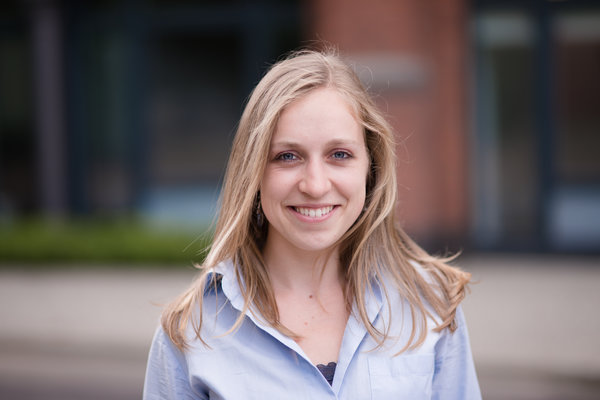IE alumnus tells about her current job

In 2016, Eline graduated from the Master Industrial Ecology. Currently she is working as a consultant in circular economy at Rebel.
How did you experience studying Industrial Ecology (IE)?
I really liked studying IE, it was inspiring! A very interesting thing about the master is the collaboration between people with different backgrounds and nationalities. I learned from others, while they were also learning from me. Working together on an assignment with interdisciplinary groups makes you aware of your background and specific knowledge of your bachelor. For example, I did a bachelor at the faculty of architecture in Delft. During my studies I learned to think in a graphical manner and became skilled in making syntheses. I was used to collaborating with people that were thinking in a similar way. When I started studying IE and was confronted with people from different disciplines, I realized that this was something I could bring to the table, Another thing I liked about studying IE were the people. The students are in general very motivated and want to contribute to a better world. Additionally, it was motivating that the emphasis of IE is on solutions for sustainability, instead of (over)analyzing the sustainability problems in our world.
Could you tell me about what you are currently doing?
Sure! I work as a consultant at a company called Rebel. Rebel originally started as a financial consultancy firm. In the first projects we were mainly advising on the collaboration between public-private organizations in large infrastructure projects such as (air)ports, highways or locks.
Public-private partnerships are still the objects of focus of our consulting work, but we have extended to other sectors besides infrastructure. The sectors in which we are involved have in common that they serve the public interest. I am for example part of a team focused on waste management and processing. For sustainability in the waste sector, collaboration between the public and private sector is vital. The right incentives are necessary to tackle sustainability issues, because they are not going to be solved by the market alone. There is demand for support in establishing these kind of collaborations and that is where we play a role.
What is an example of a project you have worked on?
For one of the bigger municipalities in the Netherlands, we worked on an analysis of waste processing opportunities present in the market. The municipality aims to reuse as much of the waste as possible and simultaneously increase local employment. To evaluate the opportunities, we involved several market parties to eventually inform the municipality on the different short-term and long term opportunities for waste processing available. Also, we report for example on the advantages and consequences of the opportunities. In these kinds of projects it is very important to know the perspective of the municipality, but also the perspective of the industry. We aim to bring these perspectives together in order to create societal value (in this case: reuse of resources at a reasonable price).
How do you apply the knowledge of Industrial Ecology in your projects?
I think it is mainly the systematic way of thinking that I apply. I noticed that I think about the entire chain of (environmental and social) impact of products or services, instead of a certain phase like use or production. Currently I am working on a project about circular packaging materials. In this project I have applied this system thinking. In order to assess the current way of working in the packaging industry, I took the entire chain - from raw material extraction to production to use and recycling – into account. Additionally, I evaluated in which stages were the most expenses. It became apparent that a large amount of money is spent on collection and sorting, while quite little is spent on recycling.
What would you advice the current students of IE?
Look around you and try different things during your masters. There are a lot of opportunities to explore what you enjoy and find important! I did for example the Climate-KIC program and a graduate internship at a company. By trying these different things, I learned what is important to me in a job.